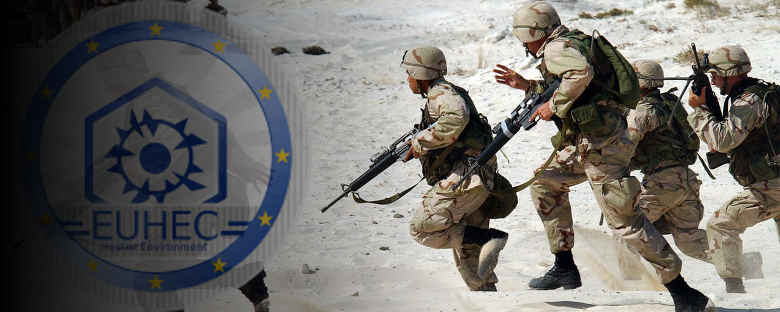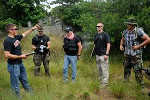EUHEC

EU Hostile Environment
Enabling officials to operate safely in hostile environments to regional and international standards.
The EU Hostile Environment Course (EUHEC) combines foundation and advanced hostile environment awareness training with a specialised medical, military intelligence and special operations platform. Training satisfies duty of care requirements for intelligence operations by improving knowledge of multiple threats in hostile environments and developing effective methods of responding to them. Training incorporates threat awareness, security procedure, risk mitigation, personal security, first aid, orientation, communication, defensive driving, weapons, explosives and survival, evasion, resistance, escape (SERE) as prescribed by international and regional curriculum. The course draws particular focus to risk management processes in international organisations with particular focus on EU risk assessment and Mission Security Planning (MSP).
Moving beyond the tactics and techniques for operating in permissive and non-permissive environments covered in other Institute programmes, the course takes students with an existing knowledge of the intelligence and security environment to a position where they can function in hostile terrain.
Target Audience
The course is oriented towards trained and experienced intelligence professionals. Therefore, in addition to the usual minimum requirements for all Institute training, applicants should also posses regional training in intelligence on the operations, analysis or command track, equivalent to the EUIOC, EUIAC, EUIMC or similar. Historically, the programme has attracted the following representation:
| Internationals: Representatives from EU, UN and other international agencies, missions and institutions. | Nationals: National intelligence, military and law-enforcement delegates attending on behalf of European states. | ||
| Non-Profits: Functionaries in a position of public trust representing the media, NGOs, charitable and other third sector organisations. | Others: Professionals from the private sector, academia and other organisations. |
Learning Objectives
|
Pre-Deployment Planning: Preemptively reduce and mitigate risks using security and counterintelligence threat assessments. Employ contingency plans and security procedures essential to performing intelligence duties in hostile environments. Rehearse individual and unit level safety and security procedures in response to specific threats. Conduct risk assessment and management to EU MSP standards. |
|
|
Advanced Trauma: Employ advanced trauma and first-aid care in field environments. Identify and provide initial treatment for post-traumatic stress disorder (PTSD), environmental stress, blast and ballistic trauma. Maintain health and fitness in the field, including vaccination, hygiene and hydration. Use trauma kits, Automated External Defibrillators (AEDs), clear airways using respiratory aids, control catastrophic bleeding and employ other advanced equipment to stabilise casualties with critical injuries. Triage multiple casualties, exercise incident management procedures and safely deliver a casualty into secondary care via an evacuation point or rendezvous. Measure vital signs, diagnose casualties, resuscitate, medicate, treat exposure, burns and soft tissue damage, use tourniquets and homeostatic agents. Manage breaks, fractures, shock, allergic reactions and anaphylaxis. |
|
|
Survival & Evasion: Demonstrate general survival and fieldcraft including fire and shelter-building, hunting, signalling, water purification and other skills. Construct improvised weaponry and equipment. Develop an evasion plan utilising evasion techniques and methods in various climates and terrain. Utilise cover, concealment, communications and tactical movement under fire. Demonstrate operational procedures for responding to Improvised Explosive Devices (IEDs), Unexploded Ordinance (UXO), mines and other area-denial weapons. Understand basic fire-fighting procedures. |
|
|
Resistance & Escape: Understand the importance of escape and resistance to interrogation, exploitation and indoctrination. Understand and apply required actions for conduct after capture and manage stress and abuse when held by force. Develop a counter-interrogation plan, anticipating and resisting coercive techniques. Develop an escape plan and exploit opportunities for escape to maximise the probability of survival. |
|
|
Defensive Driving: Understand basic vehicle safety and security practices. Employ covert and defensive tactics at vehicle checkpoints, escape or evade pursuit and employ vehicular armed response. Navigate a convoy. Follow safety and security procedures for high-speed pursuit and off-road vehicle movement in four-wheel drive. Safely extract a casualty from a vehicle and exercise safety procedures at a vehicle site. |
|
|
Weapon Familiarisation: Understand the risks posed by firearms, ammunition and explosives. Safely and legally acquire, maintain, covertly carry and operate side arms in common usage in high-risk locations. Use appropriate combat tactics in the defensive employment of side arms. |
|
|
Radio Operations: Understand and employ brevity codes, phonetic alphabet, communications security, encryption, radio operations and other procedures essential to maintaining covert communications over a radio network. |
|
|
Land Navigation: Evaluate and exploit local sources and guides. Utilise Global Positioning Satellite (GPS) technology in direction finding. Orientate and select a route with and without map and compass. Predict hazards and reduce tactical risk through terrain analysis. Plot and follow routes through unfamiliar terrain on foot or by vehicle. |
|
|
Conflict Management: Appreciate how differences in customs and culture can lead to conflict. Conduct basic research to gain information on local customs, foreign cultures and practices that could lead to conflict. Employ culturally appropriate conflict management techniques to avoid, de-escalate and diffuse conflict before it presents a physical threat. |
Course Format
The EU Hostile Environment Course is designed to develop the skills and knowledge needed to operate safely in hostile environments to a regional standard. To develop these skills a variety of formats and delivery methods have been used including:
- Flexible Delivery: Workshops and exercises as well as traditional lectures.
- Blended Learning: The latest iteration of the course combines preparatory training via our e-learning platform with consolidated learning in an intensive attendance programme.
- Coaching & Mentoring: Career advice in the security sector from recognised experts, assistance and support with course content and sustained aftercare.
Part 1 - Distance Learning
Prior to attendance each candidate must complete a preparatory learning programme delivered over no less than one month. Candidates are free to sign up at any time and on their own schedule. Therefore, between April and July the following webinars and other online events will be delivered over a secure platform. These sessions are on the more sensitive information and practical training needed to operate safely in hostile environments throughout Europe and the bordering territories. Each session is approximately 90mins in duration and most often scheduled during CET evenings and weekends to fit in with candidate's professional commitments.
- Induction & Tactical Terrain Analysis.
- Counter-interrogation.
- Urban Fieldcraft Techniques.
- Escape & Evasion.
- Covert Communications.
- Medical Technology.
- Casualty Extraction.
- Combat Tactics.
- Movement & Communication.
- Hostage Rescue (OTA*)
* Specialised optional training is offered with each of the Institute's courses. Although this extended training does not form part of the curriculum it is assessed and can offer candidates the opportunity to gain a more practical insight into a specific area of their training. These Optional Training Assessments (OTAs) are discretionary and may be offered at any point throughout the study cycle.
Part 2 - Residential School
After completion of the distance learning element in Stage I, an intensive residential school consolidates learning over five consecutive days. The majority of the school is Ex. THUNDERBOLT, a live training exercise and capability assessment during which candidates take on the role of field operatives. Candidates must attend on-site in Vienna or Dublin to complete the school.

Day 1
Induction, Conflict & Weapons Handling

Day 2
First Aid, Ballistic & Trauma Care

Day 3
Exercise Thunderbolt

Day 4
Exercise Thunderbolt

Day 5
Exercise Thunderbolt
Dates & Times
Candidates are free to sign up and begin studying at any time and on their own schedule. The residential school runs once a year, beginning on the third Monday in August and running for five consecutive days. Candidates may not be admitted to the residential school without having completed the distance learning element. Therefore, candidates should ensure they are enrolled by no later than the first week in April to provide sufficient time to complete distance-learning and access to all available scheduled events. Applications take approximately 4 weeks to process but security vetting may take up to 6 months to complete for applicants who lack a current security clearance.
Assessment
Assessment may be by any valid and accredited competency assessment meeting course requirements. However, competency is most commonly evidenced through the following combination of assessment methods:
- A pre-selection dossier including validated: security vetting, professional/academic reference checks, higher education certification (degree-level or equivalent), fitness/medical checks and evidence of a relevant career history and assessed knowledge in European security.
- A score of greater than 49% on the intelligence operations section of the MCPE or an equivalently balanced examination of similar content.
- Submission of a portfolio of work satisfying the criteria for at least a pass according to the candidate handbook.
- An approved assessor's independent testimony of observed competency across the field operations domain of the Integrated Competency Framework (ICF) for Intelligence throughout at least 10 hours of supervised professional practice.
Standards
Credentials are fully accredited for compliance with international standards. For further details on Institute requirements, international standards and accreditation, view the Accreditation page.
Certification
The EQF Level 3 Award in EU Hostile-Environment Operations accompanying this credential is earned after accruing 5 credits at approximately 50 guided learning hours.
Fees & Discounts
Not including accommodation, the course is delivered at a cost of €3000. Payment is accepted by bank transfer, card or PayPal. The following pricing options are available:
|
|
Member's Rate: If you have a current membership, log in with your user ID and password to receive a €150 discount when making your payment online. |
|
|
Group Rate: If you are booking on behalf of a group, further incentives may apply. Please contact the head of the training and directing staff for further details. |
|
|
Induction Fees: Candidates using the Institute to obtain a security clearance for the first time must also complete the Intelligence Security (INTSEC) awareness course. Those who have not studied with the Academy before must complete the Intelligence Foundations (INTFND) selection and induction course. Fees for these online short-courses are €350 and €150 respectively. |
Downloads
Location
Vienna or Dublin.
